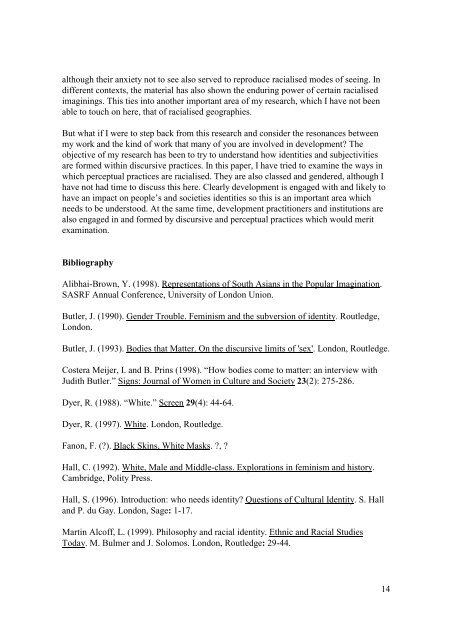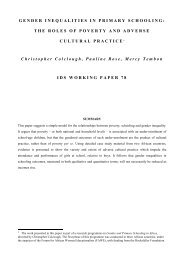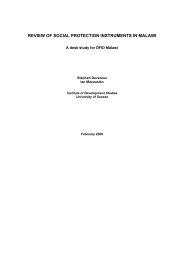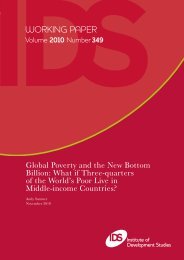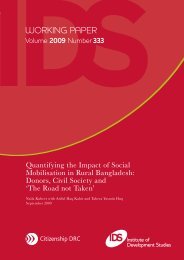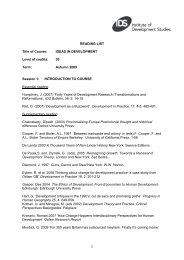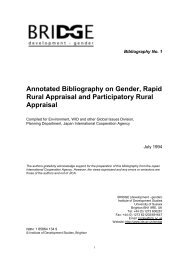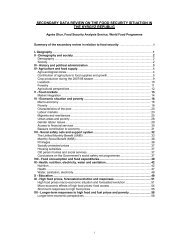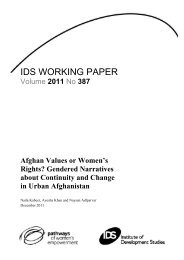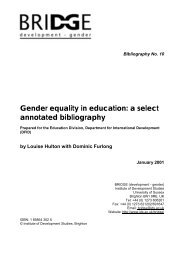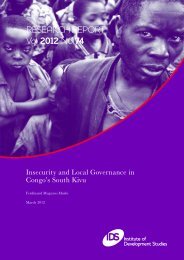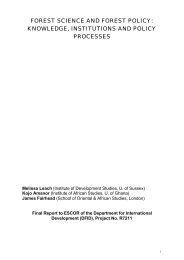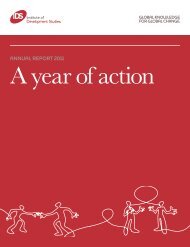1 'Troubling race. Using Judith Butler's work to think about racialised ...
1 'Troubling race. Using Judith Butler's work to think about racialised ...
1 'Troubling race. Using Judith Butler's work to think about racialised ...
You also want an ePaper? Increase the reach of your titles
YUMPU automatically turns print PDFs into web optimized ePapers that Google loves.
although their anxiety not <strong>to</strong> see also served <strong>to</strong> reproduce <strong>racialised</strong> modes of seeing. In<br />
different contexts, the material has also shown the enduring power of certain <strong>racialised</strong><br />
imaginings. This ties in<strong>to</strong> another important area of my research, which I have not been<br />
able <strong>to</strong> <strong>to</strong>uch on here, that of <strong>racialised</strong> geographies.<br />
But what if I were <strong>to</strong> step back from this research and consider the resonances between<br />
my <strong>work</strong> and the kind of <strong>work</strong> that many of you are involved in development? The<br />
objective of my research has been <strong>to</strong> try <strong>to</strong> understand how identities and subjectivities<br />
are formed within discursive practices. In this paper, I have tried <strong>to</strong> examine the ways in<br />
which perceptual practices are <strong>racialised</strong>. They are also classed and gendered, although I<br />
have not had time <strong>to</strong> discuss this here. Clearly development is engaged with and likely <strong>to</strong><br />
have an impact on people’s and societies identities so this is an important area which<br />
needs <strong>to</strong> be unders<strong>to</strong>od. At the same time, development practitioners and institutions are<br />
also engaged in and formed by discursive and perceptual practices which would merit<br />
examination.<br />
Bibliography<br />
Alibhai-Brown, Y. (1998). Representations of South Asians in the Popular Imagination.<br />
SASRF Annual Conference, University of London Union.<br />
Butler, J. (1990). Gender Trouble. Feminism and the subversion of identity. Routledge,<br />
London.<br />
Butler, J. (1993). Bodies that Matter. On the discursive limits of 'sex'. London, Routledge.<br />
Costera Meijer, I. and B. Prins (1998). “How bodies come <strong>to</strong> matter: an interview with<br />
<strong>Judith</strong> Butler.” Signs: Journal of Women in Culture and Society 23(2): 275-286.<br />
Dyer, R. (1988). “White.” Screen 29(4): 44-64.<br />
Dyer, R. (1997). White. London, Routledge.<br />
Fanon, F. (?). Black Skins, White Masks. ?, ?<br />
Hall, C. (1992). White, Male and Middle-class. Explorations in feminism and his<strong>to</strong>ry.<br />
Cambridge, Polity Press.<br />
Hall, S. (1996). Introduction: who needs identity? Questions of Cultural Identity. S. Hall<br />
and P. du Gay. London, Sage: 1-17.<br />
Martin Alcoff, L. (1999). Philosophy and racial identity. Ethnic and Racial Studies<br />
Today. M. Bulmer and J. Solomos. London, Routledge: 29-44.<br />
14


